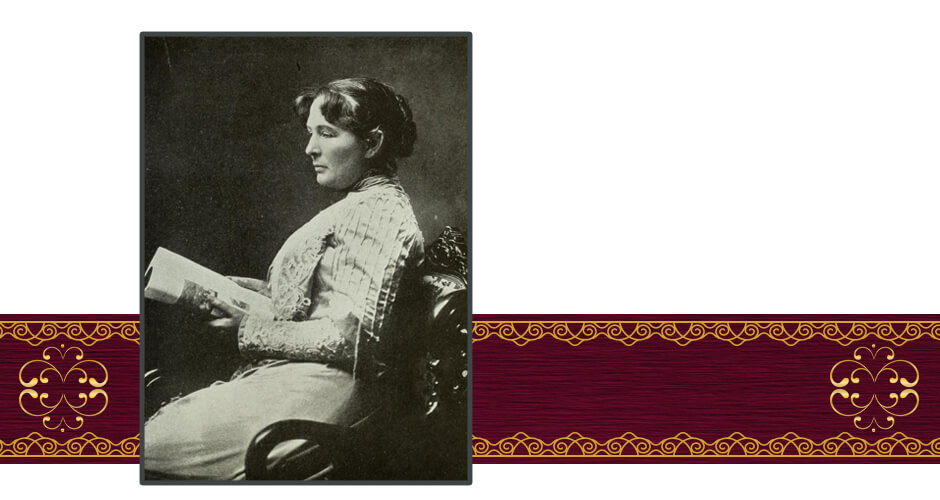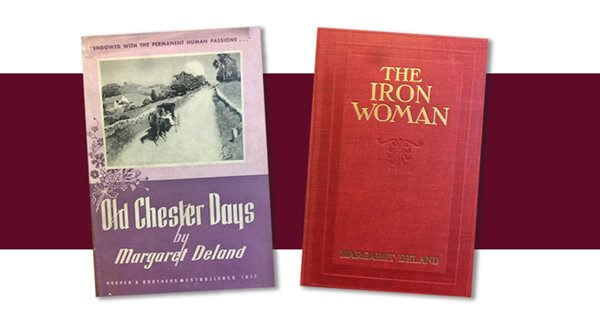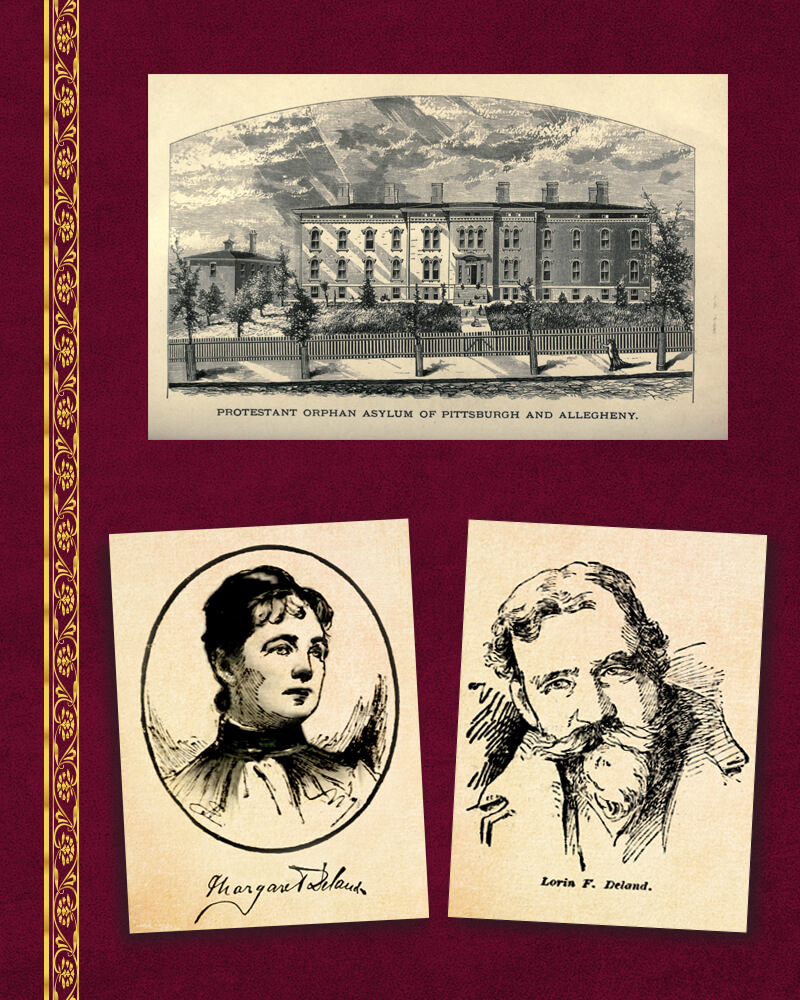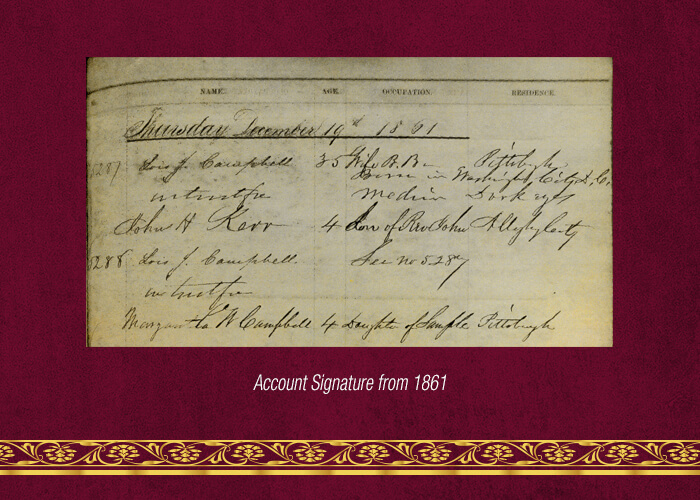Lois J. Campbell and Margaret Deland

Lois J. Campbell (1825 - 1896)
For thirty-four years, Lois Jane Wade Campbell was the secretary of the Orphan Asylum Society of Pittsburgh and Allegheny. She succeeded her mother-in-law, Nancy White Bakewell Campbell, as secretary of the organization in 1862. The Orphan Asylum Society, founded in 1832, was the first orphans' home in Western Pennsylvania. The management consisted entirely of women from the Pittsburgh community. Hundreds of orphans, including the orphans of Civil War casualties, were sheltered, educated and cared for by the society. In 1872, the organization changed its name to the Protestant Orphan Asylum of Pittsburgh and Allegheny. Lois Campbell's tenure with the Orphan Asylum covered the years when the institution maintained a stately property on Ridge and Grant Avenues in Allegheny City (North Side).
A woman of extraordinary compassion, Lois Campbell was close to her two daughters, Nancy and Margaret. When Nancy died at age 24 in 1877, the relationship between Lois and Margaret, her niece whom she had adopted as an infant, grew more bonded still. Although Margaret left Pittsburgh for school and marriage, mother and daughter engaged in close correspondence for the rest of Lois' life.
Lois' husband, Benjamin "Ben" Bakewell Campbell (1828-1900), was an energetic and highly successful entrepreneur. A graduate of Western Pennsylvania University (forerunner of the University of Pittsburgh) and Princeton, he left his law career behind and became a pioneer in the oil industry in Western Pennsylvania. He built the Bear Creek Refinery, north of Pittsburgh, and a pipeline from Western Pennsylvania to Philadelphia to transport crude oil more efficiently, a move that challenged Standard Oil's dominance in oil pipelines in the state.
As the Campbells approached their seventies, they sought out warmer temperatures in Southern California, where in-laws from both families, the Bakewells and Wades, had migrated. Lois and Ben spent winters at Baxter Terrace, a residential hotel in Santa Barbara, returning to Pittsburgh each May. Both passed away in Santa Barbara and are laid to rest there.
Margaret Deland (1857 - 1945)
Novelist Margaret Deland was born Margaretta Wade Campbell in Manchester, an area of Allegheny City, now Pittsburgh's North Side. Her mother, Margaretta, died eleven days after giving birth, and the family decided that young Margaret would be raised by her aunt and uncle, Lois and Ben Campbell. Lois was the only mother that Margaret Deland ever knew.
The Campbells' homestead in Manchester, "Maple Grove," where Margaret spent her young childhood, offered a bucolic setting and a large home library. Educated at private schools in Pittsburgh, Margaret then attended the prestigious boarding school, Pelham Priory, near New Rochelle, New York.
After graduation, she studied drawing and design at the Cooper Institute (known today as Cooper Union) in New York City, and was a design instructor at the New York Normal College when she met Boston native Lorin F. Deland (1855-1917). The two were married in Pittsburgh in 1880 and moved to Boston.
Margaret Deland's longstanding interest in writing intersected with Lorin Deland's business, a publishing company inherited from his father. When Lorin Deland sold the company in 1886, he became independently wealthy and was free to pursue his varied interests, which included advertising, chess, military history, theater and coaching the Harvard University football team. He is credited with inventing the Harvard "Flying Wedge" maneuver, debuted against Yale in 1892.
Prior to their marriage, Margaret Deland had earned sufficient money from her writing to support herself. Her marriage to Lorin Deland augmented her writing career, with her husband acting as agent and handling all contact with publishers. Her first novel, John Ward, Preacher (1888) caused an immediate sensation, which generated twenty-six printings in the first year. Her "Old Chester" stories were fond evocations of her childhood in Manchester. The Iron Woman (1911), about a widow who runs an iron mill in a 19th-century fictional locale representing Pittsburgh, was adapted by Hollywood into a 1916 silent film.

While the Delands enjoyed a comfortable lifestyle and owned a summer home in Kennebunkport, Maine, Margaret Deland was active in women's social issues. She and Lorin opened their Boston home to unwed mothers, supporting about 60 such women over a four-year period and assisting them in finding employment.
Margaret Deland authored 33 books in a writing career that spanned more than 50 years. She was elected to the National Institute of Arts and Letters in 1926 and published her final book, Golden Yesterdays, an autobiography, in 1941.
Lois J. Campbell opened two savings accounts at Dollar Bank in December 1861. One was in trust for her nephew, John H. Kerr, age four. The other was in trust for her daughter, Margaretta W. Campbell, who was also four years old.